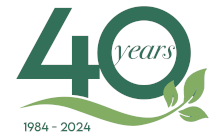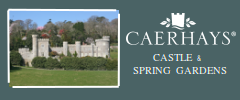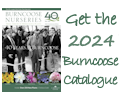Back to About us....
 Charles is the senior partner of Burncoose Nurseries.
Charles is the senior partner of Burncoose Nurseries.
He also owns and runs Caerhays Castle Gardens and Caerhays Estate. Charles’ great grandfather bred the original x williamsii strain of camellias at Caerhays in the 1920s. Caerhays are the holders of The Plant Heritage National Collection of Magnolias.
Charles is a member of the RHS Rhododendron and Camellia sub committee and has put forward many new magnolias, rhododendrons and camellias for registration and awards. Charles is the proud recipient of the coveted RHS Victoria Medal of Honour.
Catalogue Introduction from Charles for 2024 - 40 years at Burncoose!
It is incredible for me to look back 40 years to March 1984 and see my father (as the then Chairman of Cornwall County Council) cutting the ribbon to formally open Burncoose Nurseries. Present also are my brother and I and our business partners, the late and sorely missed David Knuckey, and his son, Philip, who still runs the landscaping side of our business today. David’s granddaughter, Cressy Knuckey, also runs our now, much enhanced, propagation department.
David Knuckey had moved his nursery from South Downs in Redruth to the shelter of the unused walled garden at Burncoose in 1983. David was trained as a student at Wisley and worked originally as the propagator for Treseder’s Nursery in Truro. The plan for the new business partnership came about over a rather liquid evening meal in Soho during an earlier Chelsea Flower Show. “You bring the stock and we will supply the site”. The partnership was created!
We started in a tiny caravan as our office with one telephone line and 6 staff but access for customers to the 30 acre woodland gardens at Burncoose. It is interesting to see the family members and staff who have been with us through the decades. A truly successful and enduring business involving two families which, as has often been said, is far better known in the UK generally than in Cornwall itself. Loyalty, continuity and hard work are not, perhaps, the most fashionable things in the post COVID era in which we now live.
Plants by mail order was always our business. The marketing for this involved David, and his wife Jenny, spending months each year travelling from show to show with caravans, vans and lorries packed with show and sales plants. The Royal Highland, Royal Welsh and Royal Shows, Harrogate twice a year, Southport, Malvern and regular visits to the monthly RHS Shows at Vincent Square not to mention many County Shows.
Chelsea was the highlight of the year but Hampton Court, the NEC and Tatton Park did not exist and the RHS was not then the main player in the show season. The objective was to show people new plants grown by Burncoose from across the world (New Zealand, Chile, South Africa) and encourage them to order what they saw and liked by mail order. Packing plants for despatch through the Post Office was a skilled job. Couriers did not exist and garden centres were in their infancy. I left a city career in merchant banking with Lazard Brothers & Co. Ltd in 1989 to help run the growing business which was a new venture for the Caerhays Estate and, to bring up the children at Burncoose House, rather than in Clapham.
I look back at our first printed 1985 mail order catalogue in amazement. A two litre camellia cost £2.50, rhododendrons £4.00 and a seedling or cutting grown magnolia about the same £4-5.00. Our (no pictures) catalogue listed only 428 plants. Carriage only £3.00 for orders under £10.00. That’s forty years of inflation for you but, also, larger plants!
Some 23 years ago the internet was born and many nurseries attended a seminar at the Stoneleigh Showground. Only 3 or 4 of those nurseries present even had a website at that time but the business (if not its partners with zero computer skills) had finally come of age. We were very fortunate to then employ Julie and Steve Hosegrove and Forgecom as our longstanding website designers and managers. We were soon able to market our plants to literally millions of people while gradually developing the back office systems to manage internet orders and stock control. Fifteen years ago the majority of our orders came by post or telephone. Today only 10% of our orders are not placed online.
The era of attending flower shows quickly became a thing of the past and totally uneconomic. County and Regional Agricultural Shows lost their flower tents and the RHS filled the vacuum with new dedicated flower shows. Chelsea remained at the pinnacle of the show season but their show gardens, rather than unusual and rare specialist plants, became the new populist theme of the event. Rare plants were largely irrelevant to the marketing of the new RHS Chelsea Flower Show. Who would have thought that Chelsea would even entertain gardens of weeds and rewilding even 10 years ago?
David & Jenny Knuckey were the most successful show team of their generation. Our sales point roof at Burncoose is adorned with gold medal certificates from countless shows. Burncoose has won 27 gold medals, 14 silver gilt medals, 3 silver medals and 2 bronze medals over 40 years at Chelsea (all 3 in one year with 3 stands). It is difficult to verify with the RHS and other shows if any other individuals have ever produced anything faintly approaching this sort of gold medal/show record during their lifetimes or won more cups and awards.
Taking over the huge Monument Stand at Chelsea in 1992 when, for some unknown reason, Hilliers declined to take it, was undoubtedly David’s greatest show. It cost (then) £40K, knackered everyone present, but turned the war memorial column into an ‘Oasis in the mine wastes of Cornwall’. It was even possible to have a smoke and drink in our hidden site office! A very memorable moment for me for entirely different reasons.
Returning to the present, the 3 original partners in the business are delighted to bring you our 40th mail order catalogue with the usual 300 or so new and rare plants for you to try out and enjoy for yourselves. For the second year in succession price rises are fairly minimal and, certainly, well below the current rate of inflation which we face as a business. Increasing courier costs have, however, obliged us to tinker with our standard carriage and packing costs.
We now have a 3 phase electricity connection to the main nursery, a new propagation house dedicated to growing rhododendron species (and Cornish bred rhododendron hybrids), and a new glasshouse for our more tender Mediterranean plants. Our water recycling plans are moving forward but these present huge logistical and cost issues. The easier, low hanging, fruit of roof water catchment is now well in hand. Restoration of The Copper House at the nursery entrance opens up new business opportunities for the Burncoose Estate. The Copper House was, until 1850, the centre of the Williams family’s tin mining business in Cornwall.
The RHS Show and UK government peat ban from 2025 and, in theory, 2028, remains the biggest existential threat to a large part of our business. Common sense dictates that ericaceous plants can only be grown in peat based composts with a low pH matching the soils below the peat bogs and mountain ranges where such plants grow in the wild (mainly in the Himalayas). Quite why any government would want to consign into history the widespread growing of rhododendrons, camellias and magnolias which perform spectacularly in our splendid woodland gardens beggars belief. If electric cars can replace the combustion engine surely the RHS and the Ministry of Agriculture can help to create a peat alternative that actually works for growers?
I wonder how many of our customers have been with us for 40 years? Certainly we know a few of you and, as ever, we thank you all for making the successful business which we have. Thanks also to the many longstanding and loyal staff who have been with us over the four decades. Particular mention must be made of Denis White who started work in the gardens at Burncoose in the 1950’s and still helps out with the watering today.
Burncoose has always been about rare and unusual plants. Most days of the year our website lists 4000 species and varieties of trees, shrubs and herbaceous plants available by mail order. We very much hope to be able to carry on this unique and complex plant and people business for the next 40 years with a new generation of Williams and Knuckeys.
Thank you all! Please look out for our special 40 year offers through the year and the images in our 40 year galleries.
Yours sincerely,
Charles Williams VMH
Senior Partner, Burncoose Nurseries






